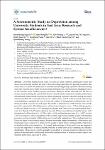Item Infomation

| Title: |
| A Scientometric Study on Depression among University Students in East Asia: Research and System Insufficiencies? |
| Authors: |
| Minh-Hoang Nguyen Manh-Tung Ho Viet-Phuong La Quynh-Yen Thi.Nguyen Manh-Toan Ho Thu-Trang Vuong Tam-Tri Le Manh-Cuong Nguyen Quan-Hoang Vuong |
| Issue Date: |
| 2020 |
| Publisher: |
| MDPI |
| Abstract: |
| Given that mental health issues are acute in Asian countries, particularly Japan and Korea, and university students are more vulnerable to depression than the general population, this study aims to examine the landscapes of scientific research regarding depressive disorders among university students and evaluate the effectiveness of international collaboration and funding provision on the scientific impact in Korea, Japan, and China. Based on articles retrieved from the Web of Science database during the period 1992–2018, we found that the number of scientific publications, international collaborations, and allocated funds regarding depressive disorder among university students in China (97 articles, 43 international collaborations, and 52 funds provided, respectively) overwhelmingly surpassed the case of Korea (37 articles, 12 international collaborations, and 15 funds provided, respectively) and Japan (24 articles, 5 international collaborations, and 6 funds provided, respectively). The differences in collaboration patterns (p-value < 0.05) and the proportion of allocated funds (p-value < 0.05) among Korea, Japan, and China were also noted using Fisher’s exact test. Based on the Poisson regression analysis, China’s associations of scientific impact with international collaboration (β = −0.322, p-value < 0.01) and funding provision (β = −0.397, p-value < 0.01) are negative, while associations of the scientific impact and scientific quality with funding provision and international collaboration were statistically insignificant. These findings hint that Korea and Japan lacked scientific output, diversity in research targets, international collaboration, and funding provision, compared to China, but the quality of either China’s internationally collaborated or funded articles was contentious. As a result, policymakers in Korea and Japan are suggested to raise the importance of mental health problems in their future policy planning and resource distribution. Moreover, it would be advisable to establish a rigorous system of evaluation for the quality of internationally collaborated and funded studies in order to increase scientific impact and maintain public trust, especially in China |
| URI: |
| https://dlib.phenikaa-uni.edu.vn/handle/PNK/393 |
| Appears in Collections |
| Bài báo khoa học |
ABSTRACTS VIEWS
211
FULLTEXT VIEWS
16
Files in This Item:
